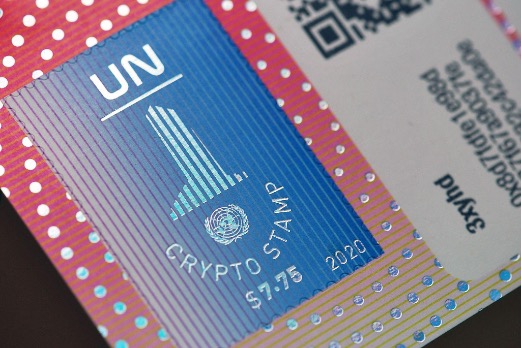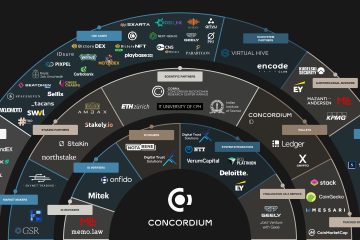Royal Joh. Enschedé, a 300-year-old Dutch printing company of secure products like banknotes, postage stamps, tax labels, passports and visas, has stepped into the world of NFT. They take this step together with PROxID, a developer of professional blockchain- and NFT solutions and Concordium, a Swiss blockchain company considered a market leader in securing digital assets via the ID layer.
This collaboration builds a bridge between the physical and the digital world: the tangible world of postage stamps and their digital twins, the so-called crypto stamps. This development adds a 21st century element to security printing and offers stamp owners and collectors a new platform to collect and trade, all the while safeguarding ownership and uniqueness of the original stamp.

Postage stamps become valuable NFTs
Postage stamps have been popular collectibles for more than 160 years, long before the metaverse and NFTs existed. Thanks to these innovations, collections can now expand beyond the physical world. Collectors can now own unique postage stamps with a connected NFT that can be traded globally on a secure platform and ultimately also be used in the metaverse.
Real-world objects and their NFT twins
Royal Joh. Enschedé, PROxID and Concordium teamed up to connect the world between security print products and the NFT and metaverse. With NFTs, real world objects now also become digital objects. The acceptance and application of NFTs will most probably follow a similar route as the world wide web has gone through before it became the Internet.
At the moment, the NFT-market is still in its infancy, and as yet not fully fit for global adoption. Currently used technologies are not efficient enough, regulation is lacking, platform safety and hack issues are seen daily, we see unreliable cost models and platform user journeys still need to become intuitive. In its essence however, a NFT, or Non-Fungible Token is a most powerful proof of purchase, proof of ownership or legal contract connected to a physical item.
NFTs in general can be issued and sold as a digital representation of ‘off-chain assets’ such as collectibles and goods. Here, NFTs act as an ownership guarantee for a real world item (the postage stamp) of which you, as a buyer, would like to have a guaranteed proof of ownership and receipt of purchase when you buy it.
Ultimately, these so-called ‘Tangible’ NFTs, like all other NFTs, can be sold or redeemed for the real world item to which it is linked. But to guarantee ownership in today’s unregulated crypto universe, you need an inextricable link to the owner, even if ownership is transferred.

More efficient, less costs, secure and environmentally sound
By design, all transaction costs on the new platform are fixed in Euro terms, which means that buyers and sellers as well as the commercial proposition offered can calculate for an efficient business model; all other platform out there have variable costs that flex with their network demand where one never knows the real cost of a transaction until it is too late.
Dutch software developer PROxID built an NFT platform on the layer-1 blockchain with the integrated ID framework of the Swiss company Concordium. Concordium has built a unique ID framework that guarantees privacy while at the same time allows every transaction to be monitored. This offers opportunities in a wide range of industries where safety, trust, value and security are mandatory.
Instant and accurate transactions are also one of the most important aspects when dealing with the blockchain and trading in NFTs. Unlike many other alternatives where one may need to wait minutes or much longer, our platform provides ultra-fast finalization to transactions which means one can immediately trust its transaction has been executed.
The platform is designed for sustainability. The Concordium software is a performance oriented language which makes it energy efficient and much greener than the current alternatives.
A new level of trust
Royal Joh. Enschedé started almost 320 years ago with secure printing and added special features to products like augmented reality, RFID-chips for track & trace and unique coding to prevent counterfeit and re-use. The next layer of history is yet to come with NFTs. Together with PROxID and Concordium the company is creating a new level of trust.
And there is more to come…
Royal Joh. Enschedé has been printing banknotes since 1814 and although the production of the Euro-banknotes was stopped several years ago, the printing of banknotes as collectables and for the entertainment industry has been further developed. The next step will be to also offer these banknotes, of which many come with stunning augmented reality features, as NFTs as well through our platform. Second only to postage stamps, banknotes are the most collected physical objects worldwide. Imagine the potential when these beautifully designed banknotes and stamps cannot only be collected in the real tangible world but also in the metaverse on a fully global scale!
Vision Royal Joh. Enschedé
Our vision is to contribute to a world without counterfeit. For centuries, we have been at the forefront of printing security documents that are very hard to copy, duplicate or counterfeit. We have been innovators all along this interesting and challenging journey. Modern technology has added many new elements to further securing documents, banknotes, stamps and other security printed material. Adding (RFID and NFC-)chips to paper, using QR and datamatrix codes that are impossible to hack and adding augmented reality to stamps and banknotes. With the endless possibilities the blockchain offers, we are entering a new phase, a new era for our company and also adding a very strong and compelling security layer to our already very secure printed products.
For more information visit the websites:
PROxID – https://proxid.nl/
Royal Joh. Enschedé – https://www.joh-enschede.nl/
Concordium – https://www.concordium.com



0 reacties